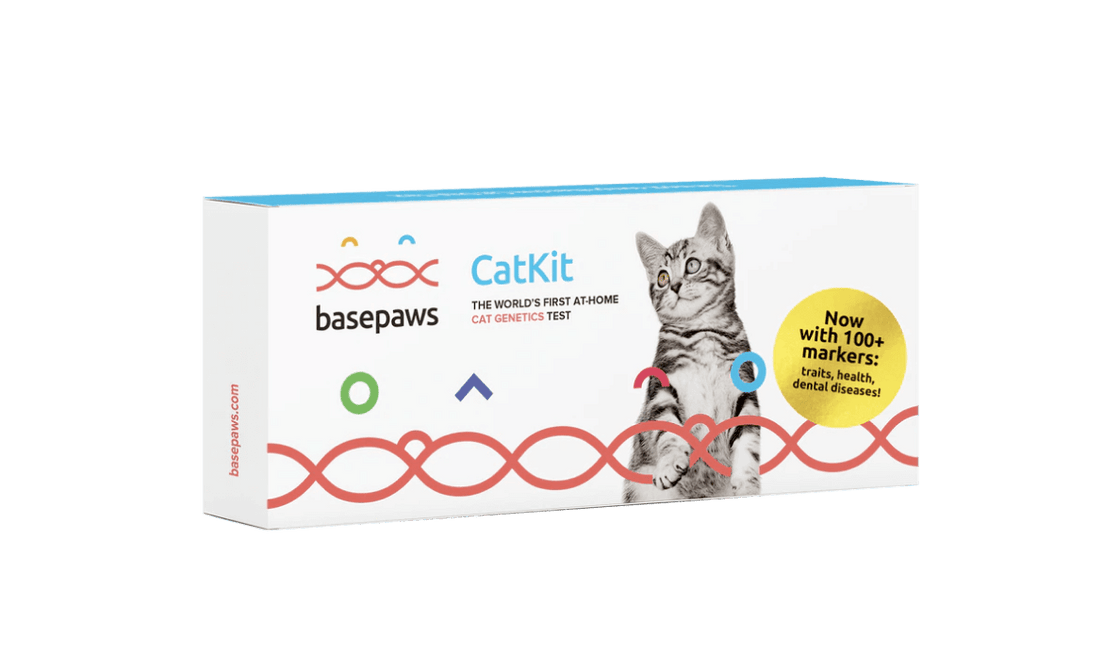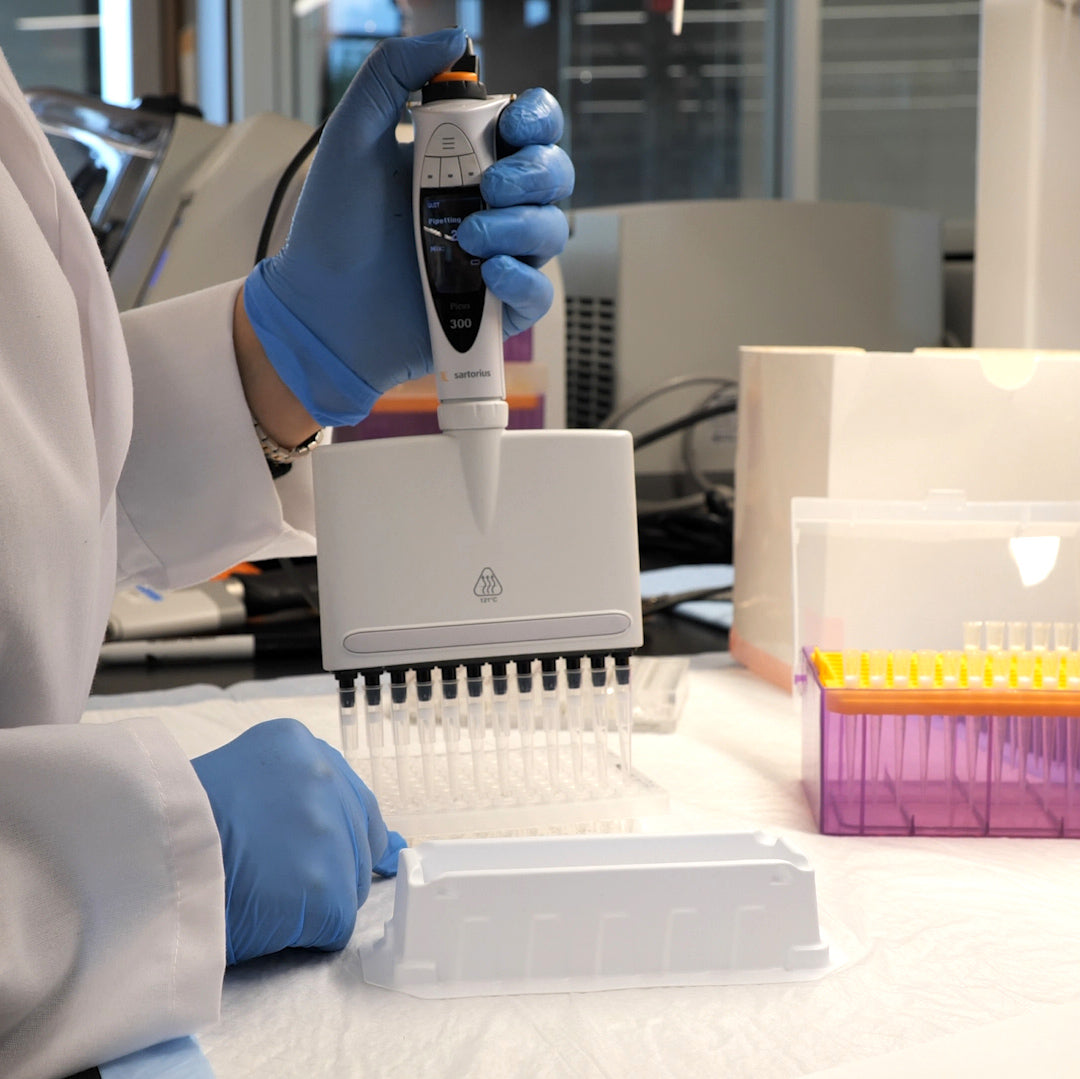Partners in Research and Innovation
We are proud to partner with pet parents and with pet health professionals on research that delivers actionable knowledge to help people make empowered, proactive decisions for the health and well-being of their pets.

Help Basepaws help all cats by participating in genetics research that supports the development of affordable screening tests that are painless for cats and easy for cat parents to use for earlier detection of disease.
These screening tests could provide more opportunities to address issues sooner with a veterinarian and implement a treatment plan that addresses a cat’s unique health needs.
Review the programs below to learn more about how you can participate in research that has the potential to create a healthier, happier future for cats everywhere.
Feline atopic dermatitis (AD), also known as feline atopy or non-flea non-food allergic dermatitis, is the second most common allergy in cats (after flea allergy dermatitis). Estimates reveal that this disease affects 12.5 percent of the domestic cat population. If your cat has been diagnosed with AD, their oral swab sample could help us to better understand the biology behind this highly prevalent disease.
Confirmed diagnosis of atopic dermatitis by a veterinarian and/or veterinary dermatologist.
Unrelated ophthalmic, respiratory, or dermatological conditions, including flea bite hypersensitivity, adverse food reaction, sarcoptic mange, pyoderma, yeast infection, and contact dermatitis. Current use of antibiotic, antiviral, or antifungal medications, as well as probiotic supplements.
CKD is a major feline health issue from which one in 30 cats suffer, often going undiagnosed in cats until the illness reaches a more advanced stage. If your cat has been diagnosed with CKD, especially before the age of five, we welcome your participation in this study.
Confirmed diagnosis of CKD by a veterinarian.
Unrelated hyperthyroidism, UTI, systemic hypertension, hypoadrenocorticism, nephrolithiasis and ureterolithiasis.
Feline diabetes (Type II) is the second most common endocrine disorder in cats. Our research aims to better understand the genetic and oral microbiome factors associated with a cat’s increased risk for the disease. If your cat has been diagnosed with Type II diabetes, please consider applying to this program.
Confirmed diagnosis of diabetes mellitus (Type II) by a veterinarian.
Renal glycosuria, stress hyperglycemia, unrelated pancreatitis, hyperadrenocorticism, acromegaly, or currently on medications such as glucocorticoids or progestogens.
Food allergic dermatitis often presents with year-round skin inflammation and itching-related discomfort. Unfortunately, this condition is an increasingly common problem seen in cats. If your cat is suffering from food allergic dermatitis, we welcome you to participate in our study to help us better understand the genetics and oral microbiome factors that may be associated with food allergies in cats.
Confirmed diagnosis of food allergic dermatitis by a veterinarian and/or veterinary dermatologist.
Unrelated ophthalmic, respiratory, or dermatological conditions, including flea bite hypersensitivity, atopic dermatitis, sarcoptic mange, pyoderma, yeast infection, contact dermatitis, superficial bacterial folliculitis, Malassezia dermatitis, otitis externa, and media. Current use of antibiotic, antiviral, or antifungal medications, as well as probiotic supplements.
Feline GI lymphoma is a notoriously hard-to-diagnose disease that is often confused with inflammatory bowel disease (IBD). If your cat has been diagnosed with B cell (large cell) or T cell (small cell) GI lymphoma, their sample can really make a difference in the development of better early detection screening tools for this disease.
Confirmed diagnosis of GI lymphoma by veterinarian.
Unrelated hyperthyroidism, intestinal neoplasia, adverse food reactions, renal and hepatic insufficiency, EPI, intestinal parasitism, enteropathy.
Is your cat healthy? Basepaws is looking for cats that have not been diagnosed with any dental, chronic, or systemic diseases, and do not currently present with an active illness (or have within the last month). If your cat is one year of age or older and has received a clean bill of health from the veterinarian within the past six months, you may qualify for this feline health research effort.
Veterinary evaluation within the last six months confirming the absence of any chronic or acute diseases.
Acute illness with onset that occurred within the last month, or that is currently present. Current use of antibiotic, antiviral, or antifungal medications, as well as probiotic supplements.
IBD is a non-cancerous condition which causes chronic irritation and inflammation of a cat’s gastrointestinal tract. If your cat has been diagnosed with IBD, especially the idiopathic form, their oral swab sample could help us uncover genetic and microbiome factors associated with increased risk of developing IBD and improve capacity for earlier detection and accurate diagnoses of IBD.
Confirmed diagnosis of IBD by a veterinarian.
Unrelated hyperthyroidism, intestinal neoplasia, adverse food reactions, viral infections (FeLV, FIV), renal and hepatic insufficiency, EPI, intestinal parasitism, enteropathy.
Anecdotal evidence suggests that the oldest cat on record lived to be 35 years old! We believe that a deeper understanding of the genetic factors that contribute to feline longevity may help increase a cat’s lifespan, but more importantly, do so in ways that enhance enjoyment of their golden years with fewer instances of pain and illness. There are ongoing studies focused on canine longevity, but no such studies exist for cats. If you have a cat aged 17 or older, they could be a perfect candidate for this groundbreaking research to help us better understand the genetic health markers associated with feline longevity.
Cats aged 17 years or older.
Cats younger than 17 years of age.
Osteoarthritis is a chronic degenerative disease that affects the tissues that comprise a joint, such as cartilage, joint capsule, and surrounding bone. The joints most commonly affected in cats are the hip, knee, ankle, and elbow.
Confirmed diagnosis of osteoarthritis by a veterinarian.
Lameness known to be related to neoplasia, primary neurologic or immunologic disorder, infection, recent joint trauma, or non-healed fracture. History of signs of intervertebral disc disease or evidence of recent injury resulting in neurologic deficit(s).
Stomatitis, also known as Feline Chronic Gingivostomatitis (FCGS), is a poorly understood dental disease that affects 0.7% to 10% of the general cat population. Basepaws is gathering DNA from cats with a stomatitis diagnosis to better understand the genetics and oral microbiome factors linked to this painful and debilitating disease.
Research results will help us add a new stomatitis risk assessment to our oral health test so that the disease can be detected earlier and help improve the prognosis for cats suffering from this condition.
Confirmed diagnosis of stomatitis by a veterinarian.
Tooth resorption; current use of antibiotic, antiviral, or antifungal medications, as well as probiotic supplements.
Feline atopic dermatitis (AD), also known as feline atopy or non-flea non-food allergic dermatitis, is the second most common allergy in cats (after flea allergy dermatitis). Estimates reveal that this disease affects 12.5 percent of the domestic cat population. If your cat has been diagnosed with AD, their oral swab sample could help us to better understand the biology behind this highly prevalent disease.
Confirmed diagnosis of atopic dermatitis by a veterinarian and/or veterinary dermatologist.
Unrelated ophthalmic, respiratory, or dermatological conditions, including flea bite hypersensitivity, adverse food reaction, sarcoptic mange, pyoderma, yeast infection, and contact dermatitis. Current use of antibiotic, antiviral, or antifungal medications, as well as probiotic supplements.
CKD is a major feline health issue from which one in 30 cats suffer, often going undiagnosed in cats until the illness reaches a more advanced stage. If your cat has been diagnosed with CKD, especially before the age of five, we welcome your participation in this study.
Confirmed diagnosis of CKD by a veterinarian.
Unrelated hyperthyroidism, UTI, systemic hypertension, hypoadrenocorticism, nephrolithiasis and ureterolithiasis.
Feline diabetes (Type II) is the second most common endocrine disorder in cats. Our research aims to better understand the genetic and oral microbiome factors associated with a cat’s increased risk for the disease. If your cat has been diagnosed with Type II diabetes, please consider applying to this program.
Confirmed diagnosis of diabetes mellitus (Type II) by a veterinarian.
Renal glycosuria, stress hyperglycemia, unrelated pancreatitis, hyperadrenocorticism, acromegaly, or currently on medications such as glucocorticoids or progestogens.
Food allergic dermatitis often presents with year-round skin inflammation and itching-related discomfort. Unfortunately, this condition is an increasingly common problem seen in cats. If your cat is suffering from food allergic dermatitis, we welcome you to participate in our study to help us better understand the genetics and oral microbiome factors that may be associated with food allergies in cats.
Confirmed diagnosis of food allergic dermatitis by a veterinarian and/or veterinary dermatologist.
Unrelated ophthalmic, respiratory, or dermatological conditions, including flea bite hypersensitivity, atopic dermatitis, sarcoptic mange, pyoderma, yeast infection, contact dermatitis, superficial bacterial folliculitis, Malassezia dermatitis, otitis externa, and media. Current use of antibiotic, antiviral, or antifungal medications, as well as probiotic supplements.
Feline GI lymphoma is a notoriously hard-to-diagnose disease that is often confused with inflammatory bowel disease (IBD). If your cat has been diagnosed with B cell (large cell) or T cell (small cell) GI lymphoma, their sample can really make a difference in the development of better early detection screening tools for this disease.
Confirmed diagnosis of GI lymphoma by veterinarian.
Unrelated hyperthyroidism, intestinal neoplasia, adverse food reactions, renal and hepatic insufficiency, EPI, intestinal parasitism, enteropathy.
Is your cat healthy? Basepaws is looking for cats that have not been diagnosed with any dental, chronic, or systemic diseases, and do not currently present with an active illness (or have within the last month). If your cat is one year of age or older and has received a clean bill of health from the veterinarian within the past six months, you may qualify for this feline health research effort.
Veterinary evaluation within the last six months confirming the absence of any chronic or acute diseases.
Acute illness with onset that occurred within the last month, or that is currently present. Current use of antibiotic, antiviral, or antifungal medications, as well as probiotic supplements.
IBD is a non-cancerous condition which causes chronic irritation and inflammation of a cat’s gastrointestinal tract. If your cat has been diagnosed with IBD, especially the idiopathic form, their oral swab sample could help us uncover genetic and microbiome factors associated with increased risk of developing IBD and improve capacity for earlier detection and accurate diagnoses of IBD.
Confirmed diagnosis of IBD by a veterinarian.
Unrelated hyperthyroidism, intestinal neoplasia, adverse food reactions, viral infections (FeLV, FIV), renal and hepatic insufficiency, EPI, intestinal parasitism, enteropathy.
Anecdotal evidence suggests that the oldest cat on record lived to be 35 years old! We believe that a deeper understanding of the genetic factors that contribute to feline longevity may help increase a cat’s lifespan, but more importantly, do so in ways that enhance enjoyment of their golden years with fewer instances of pain and illness. There are ongoing studies focused on canine longevity, but no such studies exist for cats. If you have a cat aged 17 or older, they could be a perfect candidate for this groundbreaking research to help us better understand the genetic health markers associated with feline longevity.
Cats aged 17 years or older.
Cats younger than 17 years of age.
Osteoarthritis is a chronic degenerative disease that affects the tissues that comprise a joint, such as cartilage, joint capsule, and surrounding bone. The joints most commonly affected in cats are the hip, knee, ankle, and elbow.
Confirmed diagnosis of osteoarthritis by a veterinarian.
Lameness known to be related to neoplasia, primary neurologic or immunologic disorder, infection, recent joint trauma, or non-healed fracture. History of signs of intervertebral disc disease or evidence of recent injury resulting in neurologic deficit(s).
Stomatitis, also known as Feline Chronic Gingivostomatitis (FCGS), is a poorly understood dental disease that affects 0.7% to 10% of the general cat population. Basepaws is gathering DNA from cats with a stomatitis diagnosis to better understand the genetics and oral microbiome factors linked to this painful and debilitating disease.
Research results will help us add a new stomatitis risk assessment to our oral health test so that the disease can be detected earlier and help improve the prognosis for cats suffering from this condition.
Confirmed diagnosis of stomatitis by a veterinarian.
Tooth resorption; current use of antibiotic, antiviral, or antifungal medications, as well as probiotic supplements.

Pet parents of qualifying cats will get a free Cat DNA Test to collect a sample, and a free Basepaws report to help you get to know your kitty better—inside and out! Shipping of a test is free both ways; however, Basepaws can only accommodate free shipping for cat parents based in the U.S. at this time.
"Basepaws is so grateful for our pet parent community of citizen scientists! Their participation in our research is helping to change the future of early detection and diagnosis of diseases in cats, one DNA sample at a time."


Did you know?
Humans and cats share over 90% DNA! There are also 200+ inherited human diseases that closely resemble those seen in cats. The impressive amount of genomic similarity shared between cats and humans means that the potential applications for Basepaws’ genetics research could translate to human therapeutics. Learn about how we’re exploring this in our feline longevity research.

Our Science
Discover the cutting-edge science behind the Basepaws breed, oral microbiome, and health and trait marker analyses.













